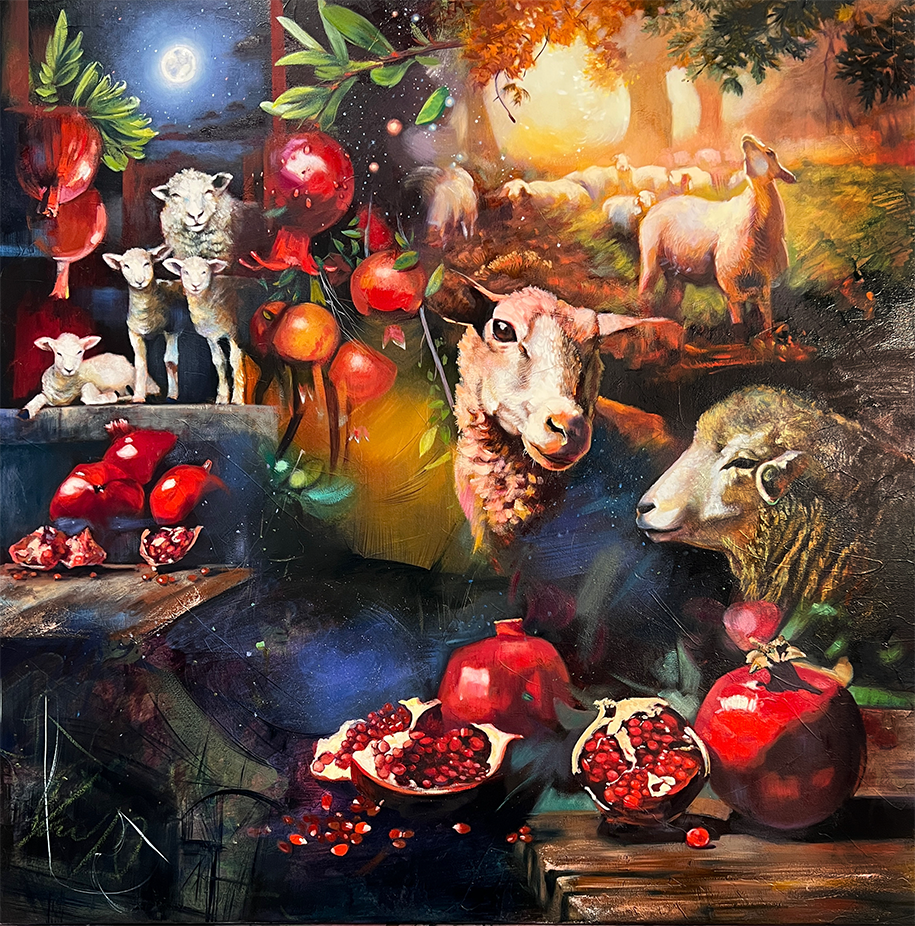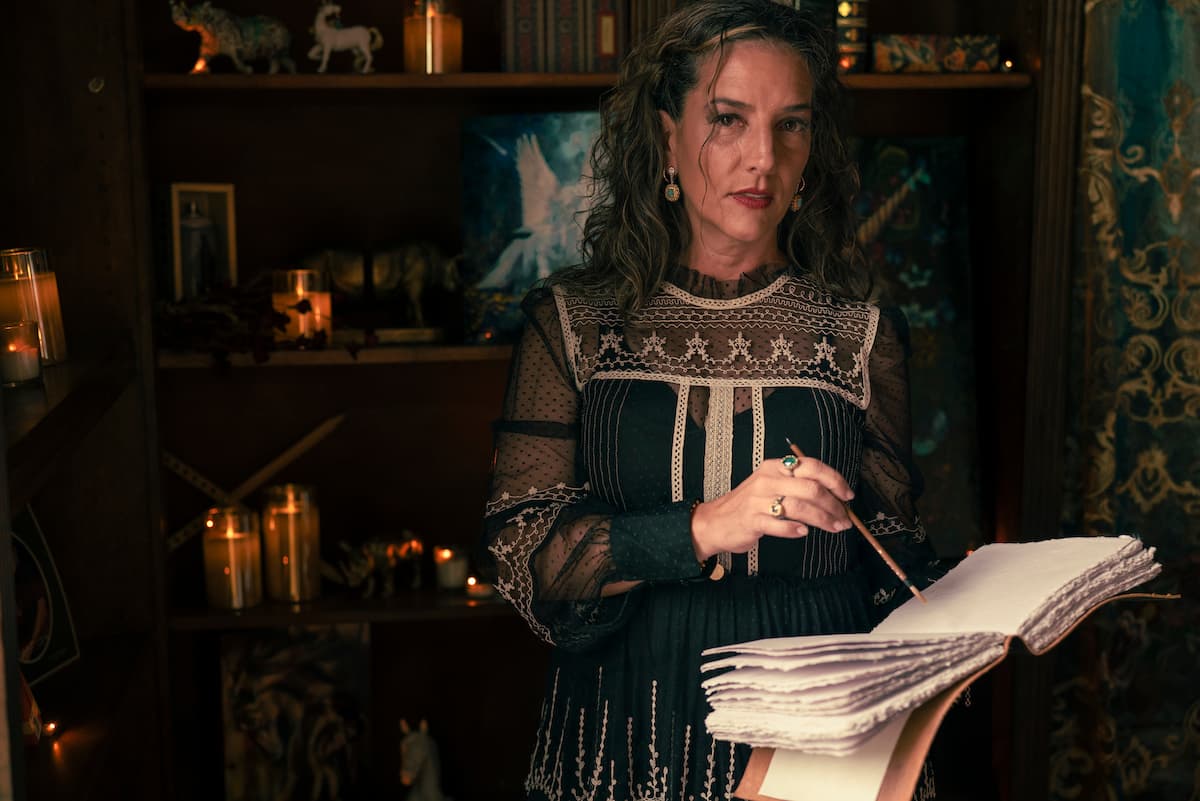Open Hands, Open Hearts: A Meal I'll Never Forget

We are only minutes away from finishing our time with a group of very impoverished Romani people in a village in western Ukraine. Mostly women and their children are meeting with us, while many of the men, who are involved with drugs, alcohol and crime, are not around.
The woman sitting in front of me has a small child of maybe three or four years old, who is happily hopping around her mother’s lap. I can see she has lice in her hair. The room is packed and hot on this cold late autumn day. The street through the village is muddy, and each dwelling looks like a stone and wooden shack. The poverty and difficulty of life is evident everywhere you look.
I’m on this trip to Ukraine with some women and my mentor Beverly, to volunteer teaching art to various groups, including the art academy at the university. This particular trip to the village is more of Beverly’s initiative, and I’m along for the ride to be supportive and to connect and pray with the people.
I feel worlds apart from them. I don't know their problems and suffering. I find it difficult to relate to what they might be feeling, worried about, or dreaming for. I don't know a ton about the gyspy Roma culture or what they struggle with. I’m trying not to focus on hygiene or health or what I see around me, but rather on their hearts and our common desire. I’m trying to see them as God sees them.
I hear rumors that we will be eating with them and that they have given their very best for us and prepared a dinner. I try to not worry or think about any past experiences I have had. If I’m honest, I am dreading the meal and hope that Beverly will get us out of it.
Eating Outside My Comfort Zone

It seems I have always struggled with eating strange and exotic food, which made me sick and nauseated. My first memory of strange food was when my mom went out of town on a business trip with her travel agency. My dad made my brother and me fried shrimp with the legs and heads on. He also made fried mussels.
My brother and I threw up all night and begged my dad for “normal” food. The next night, he made liver and onions. After one bite and loads of gagging, I refused to eat and threw a tantrum. After an hour of hearing me cry, he gave up. He couldn't figure out how to make me eat without my mother there.
When I was fourteen, I traveled to Greece and met some of my family for the first time. Every lunch and dinner was filled with amazing discoveries of food—and also foreign things that turned my stomach. They ate lobster with the green eggs coming out, fish with heads and eyeballs, and kokoretsi, which is the most disgusting thing I have tried.
After years of suffering under the Ottoman enslavement, starving Greeks learned how to survive by creating a dish from the entrails of the animals that were thrown in the streets by the Turks. Kokorestsi is the intestines wrapped around the liver, heart, kidneys, and lungs of the animal, slow-cooked on an open fire, and then sliced into small disks with lemon. It is incredibly vile and gamey, and I cannot understand how any human can eat it.
When I was 30, I went to Mexico City with Beverly, and I found myself eating with some people in a nearby village, in the middle of a field under a lean-to, surrounded by dogs barking at us from rooftops. Some women came with orange seasoned chickens boiled in a bag, and they squeezed them out onto a plate. We had onions and tortillas to eat with our boiled chicken.
A few years later, I was in the Philippines with Beverly, again having to eat all sorts of mysterious food from unknown animals. A man proudly gave us a bag full of balut, 21-day-old chicken eggs, filled with a baby chick including feathers, and I had to eat one. In Ukraine I had to eat deer stew and quail from the forest and drink warm fresh yak milk that still had hairs in it.
Each time I ate strange and unfamiliar food, I didn't really enjoy it. I couldn't get past the strangeness of it to know if it tasted good. But something in me knew to eat it and smile. To be gracious and kind and just eat it and say thank you. My mother always told me when I went to a friend’s house, “You eat whatever they give you for dinner and don't complain. It doesn’t have to be your favorite food, but I better not hear from the mother that you complained or didn't eat every bite.”
If I had a friend over and they sneered at the plate my mother gave them or whined about eating it, I knew I wouldn't ever be allowed to have that friend over again. I was always worried about my finicky friends. I had two friends who were sisters, and my mother liked the younger sister because she ate and didn't complain. The older sister was sassy and wouldn't eat the food my mother gave her. The older sister couldn't come over, so I only went to their house to play.
A Meal to Remember

Now we are piling out of the little house where we are gathering with the Roma Gypsies, and I follow Beverly down the muddy street to a simple stone house with no running water, where I see a long table set for several people. I figure this must be the leader’s house. My stomach churns with nervousness and anxiety. I think about what we’ll have to eat. Rabbit? Sheep? Gamey mystery sausage? I wish I were an established vegetarian. If I told them I was a vegetarian, would they even know what that is? It looks like they eat whatever they can get a hold of and pull from the garden.
We all sit very close to each other, and many of the Gypsies and Ukrainians smile at us through their missing teeth. One of them has all gold teeth, and I wonder how he got them. They stare at us looking very proud and joyful that we are sitting with them at their table.
Women begin bringing out dishes of pickled vegetables and potatoes. As the dishes land on the table and they hand us spoons to dish up, I can feel how happy they are to have us as guests. I can sense the vastness of honor that is present. I imagined what a sacrifice this must have been. In such poverty, I’m sure it isn't easy for everyone in the village to eat well every day. I can see that getting food is a constant struggle.
More dishes come that mostly look like various types of meat. I feel ashamed that I don't want to eat it. I know that they hoped that we would feel the lavishness of their feast and enjoy every bite. Instead, I can't help but think about how I can strategically miss a few dishes and only get a small amount of food.
Then someone prays. They tell God how grateful they are for us and ask Him to bless us on our travels and for our families to be blessed. They thank God for the food, and I can feel their true thankfulness.
Each person waits to take food until every last one of their guests has full plates. Their smiles never fade from their lips. They each take small amounts of food and continuously ask us if we want seconds. They give and give. We smile and eat.
Beverly is overtaken with emotion, and I see her eyes get misty and tears begin to flow. I feel the large lump of guilt form in my throat and tears begin. Some of the other women begin to get emotional as well. The leader becomes concerned and asks us what’s wrong. Do we not like the food? Is it not enough?
Beverly says, “No, that is not it. I’m so touched. Your love is so great and so pure. You have so incredibly honored us. Your meal tastes delicious, but the love you put in it, I will never forget.”
The women look incredibly happy, smiling and nodding at each other. Some of them even start to look a bit misty. This is more than just a meal they threw together for their guests. This is a profound manifestation of a longing and desire to connect. These beautiful people belong to a world so far from any of us American women and our trips to the salon, Facebook posts, and frustration over our Amazon box not coming on time. Yet they wanted to connect with us and tell us through their meal that we were important to them.
The Art of Generosity

With everything in me, I want to eat every bite and clean my plate. I don’t exactly know what I’m eating or if it will set well in my system, but I make every effort to enjoy it and finish. As I gather in all of the joy and take in every smile, I know this isn’t just dinner.
I finally understand that eating is more than just satiating hunger, and it’s even more than something we do for enjoyment. It's a deep sense of communion. Because eating is a universal human necessity, it engages every primal aspect of ourselves. No matter what culture or background we come from, eating unites us.
From preparing a meal to gathering to enjoy it, eating is a communal activity. Sharing a meal enforces acceptance, friendship, companionship, and connection. I realize that turning down the food someone gives you breaks connection, signals distrust, and can be felt as a form of personal rejection.
As I notice those teary eyes around the table, I realize that if I have hang-ups about food and sharing food with others, maybe I’m not as committed to connecting with people as I think.
I want my art to penetrate deeply and grip hearts. I want it to be an offering, an act of communion that invites people in, just as these Roma women did with their meal. But if I expect others to receive my art or teaching or encouragement with open hands, then I must do the same. I must sit at their tables, taste their world, and accept the love they so generously give.
Then my art can create the same feeling these Gypsies created with the food at their table, the smiles on their faces, and the tears of gratitude we shared.
How have you connected with others through food?







Thank you immensely for all that you share Elli. I have been searching and asking for direction for some time now and reading your story has reminded me of the beauty of serving. I used to be in ministry quite a while ago. The stories you share are teaching me that art and serving can be connected. I have a hard time understanding that so I am eternally grateful- your story has opened up my mind to new possibilities. What a beautiful people and experience, more precious than gold ✨🤍
———
Elli Milan Art replied:
Oh yes! Creating art IS serving. 😊
Dearest Elli
Thank you for sharing your thoughts and feelings from this deep and emotional experience. I can relate on several levels and feel very somber and pensive sitting here musing quietly with my own thoughts. It certainly gives a warming insight into who you are as a person (and as my teacher) having joined you and the Program Community two weeks ago; I feel very, very grateful.
Thank you Elli, xxx
———
Elli Milan Art replied:
Karen welcome to the community! I’m so glad you are here. 🥰
Your story resonated deeply with me as I had a similar experience years ago. I participated in an event of driving through the countryside in South Africa on a quadbike. That particular day was extremely hot and I was totally unprepared, without enough drinking water. Somehow I missed the trail and was lost for a while. I came across a small, ramshackled house in the middle of nowhere, where a very poor family lived. They offered me a big slice of melon. I noticed that it was on a very dirty tray and the knife the man sliced it with was also disgustingly covered with something else. But I can still taste the delicious coolness of the melon to this day. I was so sick afterwards from heat stroke but I believe God lead me there, because that man saved my life with a slice of melon.
———
Elli Milan Art replied:
Oh my gosh! How scary! I’m so glad you found that house and that man helped you. 🙌🏽
Your stories, with your incredible journeys and all the people you’ve touched make me understand your art so much more, your compassion ❤️ for people and to reach out to them is an awesome gift from God, very special indeed, I had tears rolling down and was visualizing every step of your journey.
———
Elli Milan Art replied:
Thank you. I’m so glad this story could touch you like that. 💕
i was just listening to the song: what the world needs now, is love sweet love
as i listened deeply it was an asking of God to provide more love. but God did place love when we were created. a pristine love to love myself and to love others.
but this love got so piled upon with unlovingness that it’s become deeply buried and dormant.
i believe asking earnestly for Divine Love helps to reawaken this self love and love for others. then, just as you said, i can fill the world with my individual brand of love by putting love into my work and putting that out to the world.
thank you for such a wonderful message.
i am a totally finicky eater so i see you being there in the midst of all the occasions of unfamiliar food as an utterly superhero’s act! my WonderWoman!!
———
Elli Milan Art replied:
Yes! Beautiful put! More love and even self love often means self sacrifice.
Leave a comment